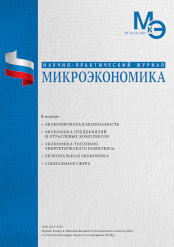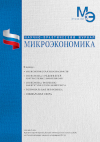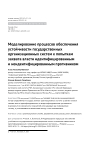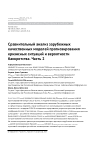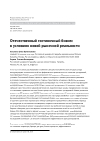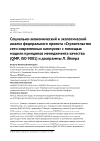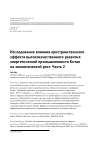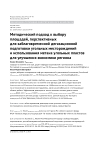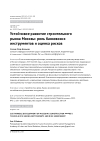Modeling the processes of ensuring the resilience of state organizational systems to attempts to seize power by an identified and unidentified enemy
DOI: 10.33917/mic-3.122.2025.5-14
The article considers the problems of counteracting the risks of initiated loss of controllability of state organizational systems in the context of attempts to seize power by an identified and unidentified enemy. A set of indicators describing the system under consideration is analyzed, and the relationships between these indicators are established.
References:
1. Abramov V.I., Loginov E.L. Agent-based approaches to the analysis and forecasting of political sentiment in society and the construction of mechanisms for adjusting positive and negative reactions to socio-political situations. Russia in the 21st century: global challenges and development prospects: Proceedings of the Seventh International Forum, Moscow, December 20–21, 2018. Moscow: IPR RAS, 2018. pp. 373-376.
2. Ageev A.I., Grabchak E.P., Loginov E.L. Use of artificial intelligence in the implementation of troop command and control of civilian facilities as a single hybrid battlefield. Neurocomputers and their application: Abstracts of the XX All-Russian Scientific Conference, Moscow, March 22, 2022. Moscow: MGPPU, 2022. pp. 31-33.
3. Ageev A.I., Ivanova O.D., Loshchinin A.A. Technology of the information space of data and improvement of public administration. Economic strategies. 2023;25(6 (192)):62-67.
4. Ageev A.I., Loginov E.L., Raikov A.N. Information systems for emergency management. Economic strategies. 2019;21(2(160)):20-29.
5. Grigoriev V.V., Loginov E.L. Strategic operations: maintaining the economic basis for the stability of the political regime of the Russian Federation in the context of international sanctions. Problems of Improving the Efficiency of Scientific Work in the Military-Industrial Complex of Russia: Proceedings of the VII All-Russian Scientific and Practical Conference, Znamensk, April 11-12, 2024. Astrakhan: Astrakhan State University named after V.N. Tatishchev, 2024. pp. 204-205.
6. Grigoriev V.V., Loginov E.L., Shkuta A.A. Development of New Intelligent Information and Analytical Services Using Factor Analysis and Clustering to Identify Transactions with Signs of Participation in the Financing of Terrorism. Bulletin of the Central Economics and Mathematics Institute. 2019;2:16.
7. Loginov E.L. Using Big Data Technologies to Counter Mass Riots in Conditions of Lack of Information and Uncertainty of the Situation Development. Artificial Intelligence (Big Data) in the Service of the Police: Collection of Articles from the International Scientific and Practical Conference, Moscow, November 28, 2019. Moscow: Academy of Management of the Ministry of Internal Affairs of the Russian Federation, 2020. pp. 145-150.
8. Loginov E.L., Matveev A.G., Shkuta A.A. Determination of Parameters of Localized States of Implicit Groups with Their Own Component of Active Behavior That Does Not Coincide with the Vector of Actions of the State Supersystem. Artificial Societies. 2019;14(1):5.
9. Loginov E.L. Interception of Control over Complex Organizational Systems in the Context of Blurring Boundaries between Physical, Cognitive, and Digital Activity Spaces and Management Environments. Economy: Theory and Practice. 2024; (1(73)):3-10.


